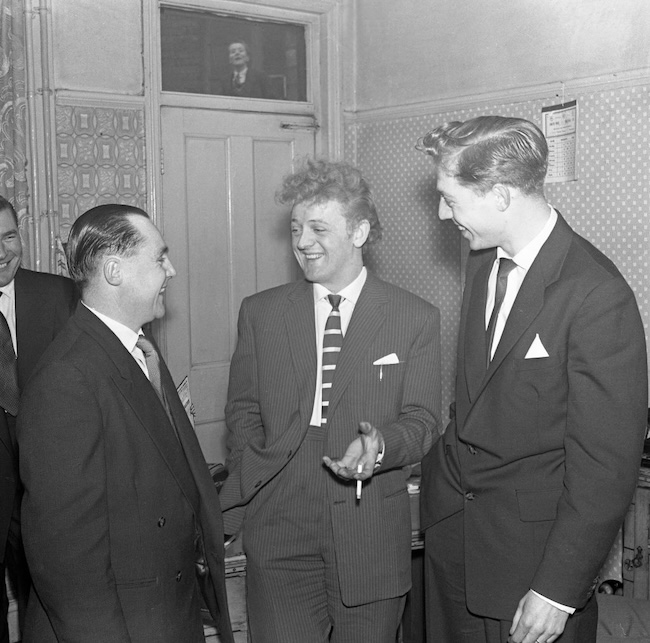
Note: Sinclair Lewis once said that one of the “two insults no human will endure” is “the assertion that he has no sense of humor” (the other is the “assertion that he has never known trouble”). Why is saying someone lacks a sense of humor such a damning indictment? Why do we like to think we possess this quality, and why do we value it in others? And why do we instinctively distrust people who take themselves too seriously?
In this excerpt from Influencing Human Behavior (published in 1925), H.A. Overstreet offers some insightful theories on these questions, as well as tips on how to improve your own sense of humor.
What a Sense of Humor Implies
Apparently, the possession of humor implies possession of a number of typical habit systems. The first is an emotional one: the habit of playfulness. Why should one be proud of being playful? For a double reason. First, playfulness connotes childhood and youth. If one can be playful, one still possesses something of the vigor and the joy of young life. If one has ceased to be playful, one writes oneself down as rigidly old. And who wishes to confess to himself that, rheumatic as are his joints, his mind and spirit are really aged? So the old man is proud of the playful joke which assures him that he is still friskily young.
But there’s a deeper implication. To be playful is, in a sense, to be free. When a person is playful, he momentarily disregards the binding necessities which compel him, in business, morals, domestic and community life. These binding necessities, for the most part, encompass our lives. We have to submit to them whether we wish to or not. We have to go to work — no play about that! We have to pay our rent, to watch our moral step, to obey the policemen, to be circumspect in our diet. Life is largely compulsion. But in play we are free! We do what we please. We make the rules. And if we lose, there’s no harm done; while if we win, there’s no sadness at having brought distress to another.
Apparently there is no dearer human wish than to be free.
But this is not simply a wish to be free from; it is also, and more deeply, a wish to be free to. What galls us is that the binding necessities do not permit us to shape our world as we please. They hand out the conditions to us. We must take them or leave them. What we most deeply desire, however, is to create our world for ourselves. Whenever we can do that, even in the slightest degree, we are happy.
To imply, therefore, that a person has a fine sense of humor is to imply that he still has in him the spirit of play, which implies even more deeply, the spirit of freedom and of creative spontaneity.
Poking Fun at the Respectabilities
In humor, the spirit of playful freedom gets frequent expression in delighted digs at “necessary things.” Why be so oppressively respectable? To be sure, we have to be respectable. We cannot do certain things. But at least we can take it out on the solemn respectabilities by saying certain things. This is what Freud calls “escaping the censor.” We all like to be a little wicked just because virtue is so uppish about it — and so confoundedly necessary!
It would almost seem as if the willingness and the wish to be somewhat flippant toward the solemn respectabilities — of state and church and sex and family — were a prerequisite for a sense of humor. For apparently the person who submits himself utterly to the social and moralistic compulsions can hardly possess that gay freedom which delights in building the world for itself; which delights, therefore, every now and then, in knocking the long-faced respectabilities endwise.
We Blunder
Not all humor, however, seeks to poke fun at the respectabilities. Much of it is concerned with our blunders. Now we can have the habit of taking all blunders seriously; then we condemn them. Or we can have the habit of playing with them. One of our newly-rich mothers made herself famous some years ago by declaring with great earnestness that she was looking up the best schools in Washington for her daughters, because, she said, she wanted her daughters to be macadamized. Stupid woman, says the serious person; she ought to have learned better English!
To see the humor of a situation, therefore, apparently requires not only the ability to blunder and to see blunders — we all possess that — but the ability to blunder and to see blunders with a certain detachment. The deadly serious person is all wrapped up in what he’s doing. The crusader, for example, is never humorous about his crusading. If he were, he would doubtless not crusade. In order to get himself properly worked up, he has to put his soul right up against one deadly, detestable fact and hold it there. He must see nothing else, particularly nothing that will mitigate the one fact. In the same manner, a person may put his soul so immediately up against himself, or his troubles, or his ambitions as to see nothing else in the universe. He then is said to take himself too seriously; and any joke made at his expense is not a joke but an insult.
Humor Is Not Censorious
But the humorous person is blessed among us because he has the habit of taking other people’s blunders rather lightly. He is not a perfectionist. There are few more deadly persons than perfectionists. They take the joy out of life because what they require of us is so dolefully beyond our powers. The finely humorous person, on the contrary, is felt to be one of us. He is not offensively our moral superior. He knows our weaknesses; but he rather suspects that he has similar weaknesses himself. Hence, when we are with him, we are comfortable. We know that he will not pry too severely into our shortcomings. He will not draw a long face and threaten us with eventual damnation.
Why We Like Humorous Persons
From the foregoing brief analysis, then, it should be clear why — other things being equal — we like persons who have a sense of humor. The humorous person has a number of delightful qualities: he is playful; free; creative; not priggish, nor fanatic, nor bigoted; he is not afraid of laughing at the too solemn respectabilities; he is not censorious; above all, he’s everlastingly and refreshingly unexpected. Therefore we like to live with him. And so because, by implication, we deny these delightful qualities, we offer the direst insult when we jokingly say to a person: “You’re all right, my friend; but you haven’t a grain of humor in you.” We mean that he had best not be around too much!
Can We Cultivate Humor?
And now we come to a difficult question: how can this fine quality of humor be cultivated? The foregoing analysis should cast some light upon the problem. Humor, we said, exhibits itself in a number of typical habits. Can we cultivate these? In the first place there is the habit of being playful. If we vaguely suspect that we have not a noticeable degree of humor, we might ask ourselves: Are we ever playful with serious things; or is it our habit always to take serious things — our work, our soul’s salvation, the salvation of our neighbors or the world — with prodigious solemnity?
The Puritan may cry out against this, but serious things apparently have to be taken with a touch of playfulness if we are not to surrender the freedom of our spirits. Why, for example, if we are scientists, be so deadly in earnest about our researches in chromosomes. Chromosomes are valuable, no doubt; but there are other things in life. Besides, there is even a possibility that one may be mistaken about one’s blessed chromosomes and that a later scientist may have a good round laugh at one’s expense. Or if it is not chromosomes, then vegetarianism, or antivivisection, or fundamentalism or birth control. We can get the habit of being playful with our serious concerns. We can knock them about a bit; be irreverent towards them; consider them temporary nuisances. We can refrain from scowling when people disagree with what we hold certain or sacred; and we can heroically restrain ourselves from passing laws to compel them to bow the knee to our beliefs.
Are we timid towards the respectabilities? Then we can learn to poke fun at them. We can realize that the world is still in the making and that the last respectability has not been cast into the mold of eternity. We can at least be proud of our ability to be free spirits and can genuinely make faces at the oftentimes royal pretender, Convention.
The first thing, of course, that we have to learn is that humor is something far more than making jokes. It is an attitude. If we are of that unfortunate number who can never remember the right joke at the right moment, we may rest easy. There are more things in the heaven and earth of humor than made-to-order jokes. The important thing is that we begin to be free with our utilitarian and conventional concerns — playfully free; that we renounce the slavery of too strict allegiance and take mental and spiritual holidays. The effect is much like an actual vacation; we come back a little boisterous and contagiously happy.
It is good to be earnest about our convictions. But not too earnest. Humanity has had a long, hard march. It is often tired and blunderheaded. Apparently there is no use getting too wrought up about the mistakes it makes. Things straighten out far more quickly in the presence of the genial and understanding mind than in the presence of the mind all ugly to condemn and to crucify.
The Crucial Test
But now we come to our real test. It is fairly easy to laugh at the incongruities in the behavior of other folk; it is not so easy to laugh at the incongruities of our own behavior. Have we been disproportionately wrathful at something that really, in the long run, amounted to little? And has our life-companion rather caustically remarked that we seem to have lost our sense of humor? To be sure, life-companions should not be caustic in such crises. Far better if husband and wife agreed beforehand on a non-irritating signal to be given on all such trying occasions. But even the mildest and most kindly-intentioned signal might only infuriate us the more.
We had best, therefore, in time of fair weather prepare for storms. We might do well then to remind ourselves fairly frequently that the most liberating ability possessed by man is the ability to laugh at himself. With sufficient self-reminding, it is not impossible to build up a laughing-at oneself habit. Our irritations, frustrations, disgust and angers would take on a most delightful sporting quality if we began to watch ourselves under stress and to note the precise moment at which, our sense of proportion completely vanishing, our humor went into the discard.
A sense of humor, then, is not to be regarded as a mysterious gift which some fortunate individuals are endowed. It is a system of prevailing habits, habits which it is apparently within the power of all of us to develop. Primary among them is the habit of playfulness. Expressed briefly, this is the habit of taking things out of their conventionally accepted relationships, as, for example, when we use a good utilitarian pillow for a pillow fight instead of for a nocturnal head-rest. So the punster plays with words when he departs from the accepted utilitarian way of holding each word strictly to a single meaning. So, again, a contest becomes play when it is agreed that losing is bereft of its conventional meaning of disaster.
To be playful, in short, is to re-create our world of binding necessities, to do with it what is not conventionally expected or required.
It seems reasonable to assert that there is no fixed or inherited degree of playfulness in each of us, but that once we are aware of the basic relation of playfulness to humor, the degree to which the former operates can be noticeably increased.
So we can learn, with moderation, to play with the serious things of life. We can play with people’s blunders. We can overcome our habits of undue censoriousness. Above all, we can grow the habit of noticing incongruities, noting them, however, without bitterness and raising them by exaggeration to laughable conspicuousness. Finally, precisely as we can direct this fine playfulness towards others, we can direct it towards ourselves, learning this solid salutatory habit of not taking ourselves too seriously.



